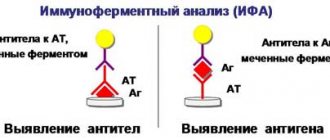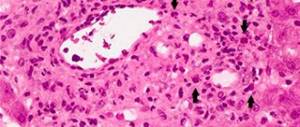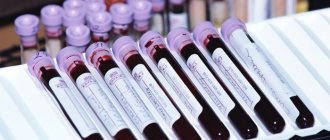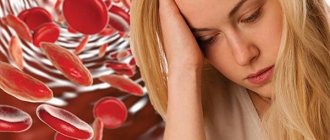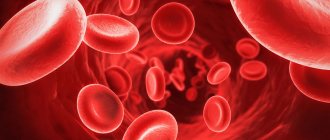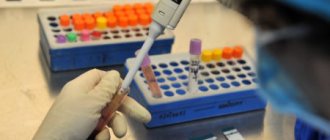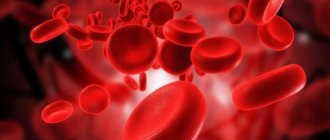Blood viscosity and hematocrit indicators
To study the problem of blood viscosity, you should focus on normal values.
- 1048-1066 are normal values that determine blood density. This indicator should not go beyond this framework. It determines the level of salts, protein components and blood elements.
- 1092-1095 are indicators of the normal specific gravity of red blood cells.
- 1024-1050 are indicators of normal plasma density.
- 40-54% is a normal hematocrit level for men.
- 37-47% is a normal hematocrit level for women.
- 4.0-5.5 is a normal level of blood viscosity.
The more red blood cells there are in the blood, the higher the blood viscosity will be. The fewer red blood cells there are, the lower the blood viscosity will be.
If a person drinks too much, or fluid is retained in his body due to kidney disease, then the viscosity of the blood will be below the permissible normal limits. A similar situation develops against the background of bearing a child, with anemia, and when undergoing therapy with certain medications (Aspirin, Heparin). The lower the density of the blood, the faster its flow through the vessels. The higher the blood density index, the slower the blood flow rate. This can lead to the development of many pathologies of the heart and blood vessels.
Diagnosis of various blood readings is carried out in different ways:
- A viscometer is used to determine blood viscosity.
- The method of immunoelectrophoresis determines which proteins are present in the blood.
- Immunochemical methods make it possible to calculate the amount of these proteins.
Diagnosis and treatment
Diagnosis includes a study of blood composition. Often, the fact that the blood is thick and dark is discovered during a general analysis, because problems with changes in viscosity cannot be felt. After the doctor has identified hyperviscosity syndrome, a comprehensive examination is prescribed, since the causes can be completely different.
To narrow down their search, the doctor conducts an oral survey of the patient and collects complaints. The symptoms of most diseases that can change blood density are noticeable, it’s just that a person cannot independently compare the changes in his body with the composition of the blood. The main clinical signs of thick blood that the doctor pays attention to are:
- dry mouth;
- heaviness in the legs;
- headache;
- constantly cold extremities;
- numbness of areas of the body in which microcirculation is impaired;
- visible nodules on the veins, others.
After this, the following examinations are prescribed:
- general blood test, repeated if necessary;
- coagulogram;
- biochemical blood test;
- glucose tolerance test;
- urine tests as prescribed by a doctor, sometimes quite general.
Advice! You can also independently calculate your water imbalance by tracking the amount of fluid you drink and the amount you naturally excrete. The amount of liquid you drink should be 200 ml more.
After the diagnosis, what to do is decided by the attending physician. Therapy aimed at thinning the blood consists of diet, medication, and the use of folk remedies.
Thick blood - what is the reason?
A healthy person's blood will not be thick.
Various pathological processes in the body lead to changes in its viscosity, among which are:
- Food poisoning and other diseases that are accompanied by severe diarrhea or vomiting.
- Hypoxia of the body.
- Antiphospholipid antibody syndrome.
- Polycythemia vera, accompanied by the accumulation of red blood cells in the blood.
- Leukemia is certain forms of the disease.
- Bone marrow tumor (Waldenström's macroglobulinemia).
- Diabetes mellitus and non-ketonemic coma.
- Disturbances in the functioning of the adrenal glands.
- All diseases that are accompanied by the production of pathological immunoglobulins or B-lymphocytes in the body (changed in their structure, molecular weight and other indicators), for example, myeloma.
- Paraproteinemic hemoblastoses (BTC) and amyloid dystrophy.
- Thrombophilia.
- Serious liver disorders (cirrhosis and hepatitis).
- Inflammation of the pancreas.
- The period of bearing a child.
- Varicose veins.
- Burns.
The thicker the blood, the harder it will be for the heart to do its job.
Increased blood viscosity as an adaptation mechanism
Pregnancy and thick blood
Sometimes the blood becomes thicker during pregnancy. In some cases, the body tries to prevent the threat of miscarriage in this way. Also, the blood becomes more viscous immediately before childbirth, because it is associated with blood loss. Nature has endowed a woman’s body with the ability to thicken blood in order to prevent the development of heavy bleeding.
Therefore, blood is drawn regularly from all women during pregnancy to monitor the level of hematocrit, hemoglobin and red blood cells. To monitor changes in the amount of certain blood proteins, the expectant mother is sent for a coagulogram. It occurs at different stages of pregnancy.
If blood viscosity increases significantly, the doctor will prescribe therapy for the woman. Sometimes, in order to normalize blood viscosity, it is enough to simply adjust your menu; traditional methods of treatment have a good effect, but before using them you should consult a doctor.
The doctor may also prescribe medications to thin the blood; the regimen is selected on an individual basis.
A significant increase in blood viscosity cannot be ignored, since during pregnancy this can lead to thrombosis, thrombophilia, leukemia or varicose veins. Damage to the vascular bed poses a danger not only to the woman herself, but also to the child.
Thick blood in a newborn baby
In a baby who has just been born, the blood is dark in color and has increased viscosity. The blood values of a newborn differ significantly from similar data in older children. So, in the first 24 hours after the baby is born, the level of red blood cells is 5.5 * 1012/l, and the hemoglobin level reaches 200 g/l. There is no need to worry about this; a few days will pass and these numbers will begin to decline.
Thick blood in a newborn is not a deviation from the norm. It’s just that the child grew up and developed in a radically different environment, and now he has found himself in a new world. His body needs time to adapt to changed environmental conditions, for example, to learn to breathe differently.
About 50% of hemoglobin will disintegrate in the first days after the birth of a child. By the way, it is this hemoglobin, which is called fetal hemoglobin, that causes the development of jaundice in newborns. By the first year of life, fetal hemoglobin in the child’s blood will occupy no more than 1%. Other blood parameters, including viscosity and hemoglobin level, are equal to similar values in an adult.
How to reduce blood thickness
Hence the task of thinning the blood in necessary cases arises. This will be greatly helped by diet and a special drinking regimen. Drink at least one and a half liters of fluid per day. Green tea or herbal teas, freshly squeezed juices from vegetables and fruits, and clean water are preferable. Natural red grape juice, teeming with bioflavonoids, is highly recommended. For the cardiovascular system it is the elixir of life.
To maintain normal blood viscosity, food must contain a balanced amount of proteins, fats, carbohydrates, vitamins, macro- and microelements. The main supplier of protein should be fish, preferably sea fish, as well as eggs and dairy products. Twice a week the menu should include meat, which most recently was chicken or turkey. The consumption of animal protein should be limited if possible if you are struggling to reduce blood density.
Symptoms of thick blood
Thick blood is not an independent disease. An increase in its viscosity only indicates the presence of one or another pathology in the body. Multiple circumstances can lead to blood thickening. Therefore, it is so important to determine the true cause that led to an increase in blood viscosity. The symptoms of this condition will directly depend on them.
Sometimes a person does not even suspect that the blood in his body is too thick. Since the symptoms of this disorder develop only in severe cases: when problems with the normal flow of blood appear, blood clots form in the vessels, etc.
Blood thickening can be suspected only by such indirect signs as:
- Frequent headaches.
- Numbness of the limbs, tingling in various parts of the body.
- Chronic fatigue and weakness.
If blood thickening occurs against the background of dehydration or hypoxia, then after the elimination of these conditions, the person’s well-being will return to normal.
What foods thicken the blood
Along with useful products that have a preventive or therapeutic effect on the circulatory system, there are also those that doctors prohibit people with thick blood from consuming.
Photo source: shutterstock.com
These include:
- bakery products;
- cakes;
- canned food;
- sausages;
- dairy products;
- milk.
It is also not recommended to consume foods that contain large amounts of vitamin K. It is this that provokes increased blood clotting.
Complications and consequences
If the blood has high viscosity, this can lead to serious health problems.
Possible consequences include:
- The formation of blood clots, which most often clog small-diameter vessels, disrupting the normal flow of blood in them. Sometimes blood clots can form in the main vessels and even in the brain. In this case, the consequences for the body can be very dire, including death due to a stroke or heart attack.
- If a person’s blood thickens against the background of a decrease in platelet levels, which is accompanied by poor circulation, then the consequence of this situation may be increased bleeding. Such disorders develop in leukemia, myeloma, Waldenström macroglobulinemia and more. All these diseases are very serious and often incurable.
- Hyperosmolar coma, in which there is increased blood viscosity, can lead to the development of intracerebral bleeding. The pathogenesis of coma is incredibly complex, but blood viscosity will always be increased. This condition carries a risk of death.
Thick blood can cause serious disorders in the body. They will be more severe, the more complex the underlying disease or pathological condition that led to blood thickening.
How can you thin your blood?
In the presence of underlying diseases occurring with high blood viscosity syndrome, therapy is required aimed at compensating for their manifestations. For preventive purposes, special nutrition and folk remedies are used. If circulatory and microcirculation disorders are detected or there is a high risk of thrombosis, antiplatelet agents are indicated that prevent clots from forming.
Products
The main factor in thinning the blood is sufficient drinking regimen. You need to determine your individual fluid norm. For people without a tendency to edema and congestion, the norm is 30 ml per kilogram of weight. To prevent thrombosis, it is important to drink it correctly. For convenience, the entire amount of water for the day should be poured into one container in order to control the volume drunk.
A single dose is 100 ml. The largest part should be drunk from morning to 18 o'clock in the afternoon, and before bedtime, take the remaining 100 ml. If the menu includes coffee or strong tea, then for each cup you need to drink an additional half glass. For heart failure and renal edema, the dose is calculated individually, usually it averages 1-1.2 liters. The best option is ordinary purified water without gas.
Products that improve blood flow include:
- lemons,
- grapefruit,
- ginger,
- garlic,
- vegetable oil,
- fish fat,
- nuts,
- seafood,
- Apple vinegar,
- tomatoes,
- dark chocolate (bitter),
- bell pepper,
- cherry,
- cranberry,
- melon,
- blueberry,
- Strawberry wild-strawberry,
- wheat sprouts,
- pumpkin,
- cucumbers,
- zucchini.
Thicken the blood: meat and meat broths, smoked meats, sausage, canned food, marinades, fatty sour cream, cream and cottage cheese, sweets, white flour products, salty, spicy and fried foods, offal, semi-finished products. They should be excluded from the diet as much as possible to prevent thrombosis. There are also foods that need to be limited. This means that they should not be on the menu every day. This list includes:
- buckwheat,
- legumes,
- bananas,
- mango,
- white grapes,
- cabbage,
- leafy greens.
They provide for the limitation or exclusion of meat and decoctions, the predominant introduction of vegetables, fruits, low-fat dairy products, vegetable protein and unsaturated fatty acids into the diet.
Traditional methods
Medicinal plants that improve blood flow include:
- raspberry leaves, black currant, ginkgo biloba, fireweed, lemon balm;
- clover and chestnut flowers;
- sweet clover grass, meadowsweet;
- bark from willow and cherry branches.
Conservative treatment
For atherosclerosis and coronary heart disease, a person is prescribed Acetylsalicylic acid and drugs based on it to thin the blood. This measure helps reduce the likelihood of developing myocardial infarction.
Depending on the cause that led to blood thickening, the patient may be recommended to undergo the following treatment:
- Bring metabolic processes back to normal.
- Take medications that prevent blood clots from forming in the body.
- Get treatment to eliminate bone marrow tumors.
The patient must understand that there is no single treatment regimen. Therapy depends on what specific problem led to the increase in blood viscosity. To eliminate increased blood clotting, medications such as Heparin, Fragmin, Warfarin, etc. will be prescribed.
If there is a high risk of bleeding, for example, with multiple myeloma, anticoagulant therapy, on the contrary, is strictly contraindicated. To prevent the development of hemorrhagic syndrome, the patient is prescribed plasmapheresis, platelet transfusion, or other treatment is prescribed, according to the existing symptoms.
Treatment of high viscosity
How to reduce blood viscosity? To reduce the number of formed elements, the patient requires special therapy, including treatment of the pathology that provoked this condition. In addition, the patient is prescribed a diet and medications that reduce the density of leukocytes, red blood cells and platelets.
There is no specific treatment regimen. Treatment tactics always depend on the patient’s clinical picture. The general principles of combating high viscosity include correction of metabolic processes, prevention of blood clots, and treatment of neoplasms of hematopoietic tissue.
Drug treatment
The main drug used to reduce blood viscosity is aspirin. The drug reduces viscosity and prevents the formation of clots. Despite the fact that the medicine is sold without a prescription, self-treatment with it is not recommended. The dose and regimen of taking Aspirin depend on the characteristics of the patient’s condition and are selected exclusively by the doctor.
Treatment of the disease is often carried out with the help of Aspirin and drugs that have a similar effect
Among other medications used for the disease, the following should be highlighted:
- Ginkgo biloba,
- Cardiomagnyl,
- Aspecard,
- Fenilin,
- Aescusan.
This or that drug is prescribed taking into account the person’s diagnosis, because increased viscosity is a consequence of a variety of pathologies. Pregnant women are often prescribed the medicine Curantil. In addition to its ability to thin the blood, it strengthens the walls of veins and capillaries and has an immunomodulatory effect.
Patients suffering from varicose veins of the legs are recommended to take Curantil in combination with Lyoton. This medicinal union prevents the formation of blood clots and increases blood circulation through the vessels. For thrombosis, patients are prescribed drugs such as Warfarin and Heparin.
Any medications are used under the strict supervision of a doctor. Self-medication for this condition is unacceptable.
Nutritional Features
A special diet helps reduce blood viscosity. In medical practice it is called table No. 10. This nutrition is often prescribed for various cardiovascular pathologies, during the recovery period after a heart attack, for atherosclerosis, and coronary heart disease.
The following products help reduce increased blood density:
- berries - blueberries, cherries, strawberries, white and red currants, gooseberries, cranberries;
- fruits – oranges, lemons, peaches, apples;
- vegetables – cucumbers, tomatoes, beets;
- spices – garlic, ginger, pepper, cinnamon;
- dark chocolate, cocoa, coffee.
These are just some of the foods that have a positive effect on the body. You can learn more about the diet from a nutritionist or your doctor.
Patients with pathology are recommended to introduce garlic, ginger and other healthy foods into their daily diet.
Traditional treatment
With your doctor's permission, you can try auxiliary treatment using folk remedies. For this purpose, the healing properties of some herbs and plants are used. Yellow sweet clover herb, hawthorn berries, meadowsweet, valerian root, lemon balm, narrow-leaved fireweed and others have thinning properties. The herbs can be brewed and drunk instead of tea, separately or together. You are allowed to drink no more than a glass of medicinal drink per day.
Flax oil has good thinning and antithrombotic properties. The product helps to establish metabolic processes, remove excess cholesterol, and prevent the development of atherosclerosis. It is recommended to drink the oil one tablespoon after sleep on an empty stomach. The course of therapy should be 2 weeks, then a break and repeat treatment.
Another effective remedy is apple cider vinegar. This product helps remove waste, toxins and other negative products from the body. You should drink vinegar for 1.5–2 months, 2 teaspoons diluted in a glass of water.





